Getting Rid of Bermuda
goneriding
16 years ago
Featured Answer
Sort by:Oldest
Comments (58)
Okiedawn OK Zone 7
16 years agolast modified: 9 years agoscottokla
16 years agolast modified: 9 years agoRelated Discussions
How to get rid of bermuda grass
Comments (7)Well I use the Lasagna method and completely organic in my beds and garden. But I do it a bit differently than most, and you are not going to like what I say, but it works. When I start a new bed, I start in the fall. I first hit the area with Round UP, wait a week and hit it again, then wait another week. Then I just scalp the area and remove the debris. OK here is my secret. I donÂt use newspaper, I use heavy duty card board and lay is down on the dead grass, then build up the bed with whatever I got. Wait till spring, plant, and use a heavy layer of Mulch. Now I am in TX, but with you being in GA, Bermuda will try to invade, there is just no way around it. If you have the beds built up correctly, it is very easy to control by just pulling what shows up. I promise you the grass growing along the edge of the bed will see that nice fertile moist soil, and it will cross the barrier to get in....See MoreHelp me get rid of bermuda PLEASE
Comments (11)On August 17th I sprayed my entire yard with glyphosate. I had a mixture of fescue, common bermuda, dallisgrass, crabgrass, and a few wild violets. We've had plenty of rain all summer and had a good rain the day before I sprayed. Ended up with a 100% kill. Two weeks after spraying I cut and bagged everything down to 1.5 inches. I watered for the next week and only had a few small sprigs of stuff that came back. On September 14th I filled in sink holes from where the original builder buried stumps, back filled my concrete driveway, and leveled out a few low spots in the yard trying to get it as smooth as possible. Then on September 16th I put down tall fescue seed from Hogans and put down a thin layer of straw. Began watering it 3 times per day and yesterday I did find about 6 sprigs of bermuda which was easily pulled up. Maybe I've just been lucky or possibly the bermuda will take over next summer. Guess I'll have to wait and see. I woke up this morning and found the new fescue has begun to germinate! I do plan to use a pre emergent in the spring mainly due to the crabgrass and dallisgrass. My biggest concern it the neighbors yard. It is a mix of fescue, bermuda, and weeds that I hope to keep from migrating into my lawn. I have found that triclopyr is really hard on bermuda but doesn't hurt tall fescue. Might have to give that a try at the property line. I think if I can make it through the next year I should be fine. In your case, if you get started on it early enough next year you should be able to get rid of the bermuda but it will take time and persistence....See MoreGetting rid of Bermuda Grass
Comments (12)I have bermuda that survives everything! Landscape cloth-that was sure fun to try to remove it, with the bermuda growing thru it everywhere. Black plastic? Four years--I removed it---white bermuda--heading for the edges of the plastic! Roundup? gave it a belly ache for a week, revived-sprayed again--didnt phase it the second time. I did use the Poast on a bed that had various flowers--all my poppies, Iris, clematis--tryed it over the top, as it said--forgot it--month later--IT WAS DEAD-and didnt harm flowers. But--I'd still be cautious around flowers. Glenda, I love the corn gluten meal--my onions didnt have a weed for 3 months--which is when I was supposed to have re-applied it. Everyone remember tho--don't put it where you WANT seeds to come up. Worse of all?? my horses don't even like it!...See MoreGetting rid of Bermuda Grass
Comments (17)At one of the Middle TN Plant Swaps a couple of years ago Cissy Ziech did a program on Lasagna Gardening. She reported that in her Memphis garden that Roundup was not totally effective in killing Bermuda and she had to resort to a different grass killer. I believe it was Grass Be Gon like arjo_reich said but am not positive. I would wait to till the garden until all the Bermuda was killed because the tiller will chop it to tiny pieces which will each grow to a new plant and multiply your problem. Have you considered creating raised beds as in Lasagna Gardening? (If you're not familiar with that, do a search on GW and you'll get lots of info.) After killing the Bermuda, you wouldn't have to till where you intend to grow garden plants - only the lawn area....See Moreokiegardeningmom
16 years agolast modified: 9 years agoOkiedawn OK Zone 7
16 years agolast modified: 9 years agoMacmex
16 years agolast modified: 9 years agoOkiedawn OK Zone 7
16 years agolast modified: 9 years agomulberryknob
16 years agolast modified: 9 years agoOkiedawn OK Zone 7
16 years agolast modified: 9 years agoscottokla
16 years agolast modified: 9 years agodarci60
16 years agolast modified: 9 years agoOkiedawn OK Zone 7
16 years agolast modified: 9 years agogoneriding
16 years agolast modified: 9 years agoLisa_H OK
16 years agolast modified: 9 years agoilene_in_neok
16 years agolast modified: 9 years agomulberryknob
16 years agolast modified: 9 years agoOkiedawn OK Zone 7
16 years agolast modified: 9 years agoOklaMoni
16 years agolast modified: 9 years agoMacmex
16 years agolast modified: 9 years agokatrina1
16 years agolast modified: 9 years agomaryhorse
16 years agolast modified: 9 years agoMacmex
16 years agolast modified: 9 years agoMacmex
16 years agolast modified: 9 years agoanney
16 years agolast modified: 9 years agoOkiedawn OK Zone 7
16 years agolast modified: 9 years agoanney
16 years agolast modified: 9 years agoOkiedawn OK Zone 7
16 years agolast modified: 9 years agoilene_in_neok
16 years agolast modified: 9 years agookiedivot
16 years agolast modified: 9 years agoanney
16 years agolast modified: 9 years agookiedivot
15 years agolast modified: 9 years agobagsmom
15 years agolast modified: 9 years agoseedmama
15 years agolast modified: 9 years agochickencoupe
9 years agolast modified: 9 years agoLisa_H OK
9 years agochickencoupe
9 years agoOkiedawn OK Zone 7
9 years agochickencoupe
9 years agoLisa_H OK
9 years agochickencoupe
9 years agoLisa_H OK
9 years agochickencoupe
9 years agojessaka
9 years agoLisa_H OK
9 years agoslowpoke_gardener
9 years agoOkiedawn OK Zone 7
9 years agochickencoupe
9 years agochickencoupe
9 years agojessaka
9 years agotexjagman
9 years ago
Related Stories

EDIBLE GARDENSNatural Ways to Get Rid of Weeds in Your Garden
Use these techniques to help prevent the spread of weeds and to learn about your soil
Full Story
MOST POPULARHow to Get Rid of Those Pesky Summer Fruit Flies
Learn what fruit flies are, how to prevent them and how to get rid of them in your home
Full Story
DECORATING GUIDESLose It: How to Get Rid of Old Light Bulbs
When the light goes out, you'll want to get rid of the bulb safely. Here's how
Full Story
DECORATING GUIDESUse It or Lose It: How to Get Rid of Old Keys
Clean out your junk drawer by getting rid of keys in an earth-friendly way
Full Story
DECLUTTERINGDownsizing Help: How to Get Rid of Your Extra Stuff
Sell, consign, donate? We walk you through the options so you can sail through scaling down
Full Story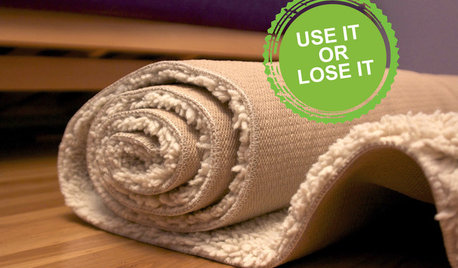
DECORATING GUIDESLose It: 4 Ways to Get Rid of Your Old Carpet
Try one of these earth-friendly tips before stuffing your dingy carpet or rug in the trash
Full Story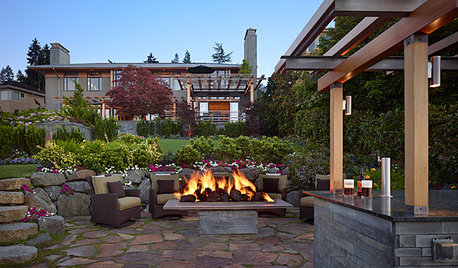
GARDENING AND LANDSCAPING4 Good Ways to Get Rid of Mosquitos in Your Yard
Stay safe from West Nile virus and put an end to irksome itches with these tools and methods for a porch, patio or yard
Full Story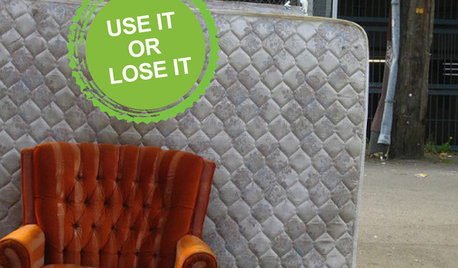
DECORATING GUIDESLose It: How to Get Rid of a Mattress
Updating your bedroom? Here's how to donate, reuse or recycle that mattress — and keep it out of the landfill
Full Story
MORE ROOMSHome Tech: Getting Rid of Wires Without Sacrificing Sound
Wireless home technology still isn't perfect, but new products are giving audiophiles choices
Full Story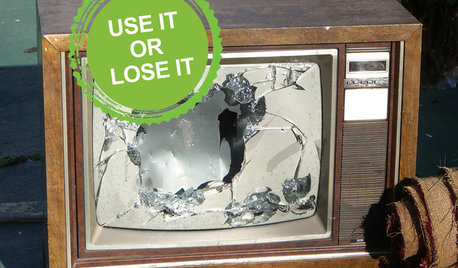
DECORATING GUIDESCleaning Out: The Right Way to Get Rid of Electronics
Learn how to dispose of worn-out electronics in a safer, more Earth-friendly way
Full StorySponsored



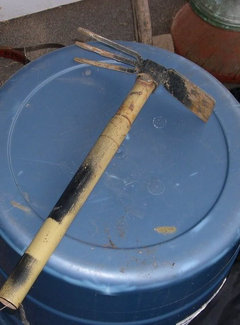
Okiedawn OK Zone 7